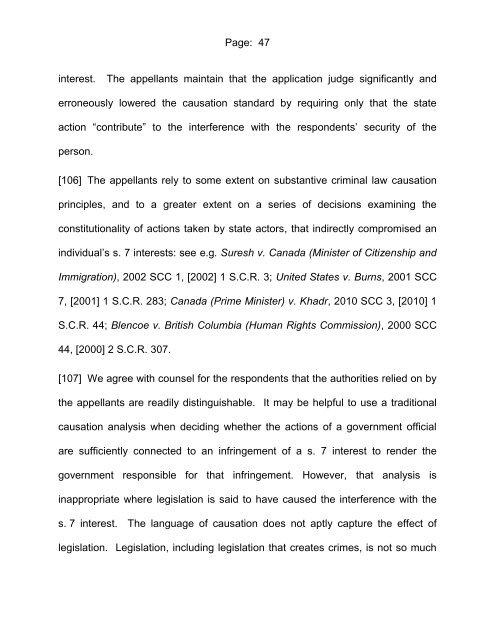Canada (Attorney General) v. Bedford, 2012 ONCA ... - York University
Canada (Attorney General) v. Bedford, 2012 ONCA ... - York University
Canada (Attorney General) v. Bedford, 2012 ONCA ... - York University
Create successful ePaper yourself
Turn your PDF publications into a flip-book with our unique Google optimized e-Paper software.
Page: 47interest.The appellants maintain that the application judge significantly anderroneously lowered the causation standard by requiring only that the stateaction “contribute” to the interference with the respondents‟ security of theperson.[106] The appellants rely to some extent on substantive criminal law causationprinciples, and to a greater extent on a series of decisions examining theconstitutionality of actions taken by state actors, that indirectly compromised anindividual‟s s. 7 interests: see e.g. Suresh v. <strong>Canada</strong> (Minister of Citizenship andImmigration), 2002 SCC 1, [2002] 1 S.C.R. 3; United States v. Burns, 2001 SCC7, [2001] 1 S.C.R. 283; <strong>Canada</strong> (Prime Minister) v. Khadr, 2010 SCC 3, [2010] 1S.C.R. 44; Blencoe v. British Columbia (Human Rights Commission), 2000 SCC44, [2000] 2 S.C.R. 307.[107] We agree with counsel for the respondents that the authorities relied on bythe appellants are readily distinguishable. It may be helpful to use a traditionalcausation analysis when deciding whether the actions of a government officialare sufficiently connected to an infringement of a s. 7 interest to render thegovernment responsible for that infringement. However, that analysis isinappropriate where legislation is said to have caused the interference with thes. 7 interest. The language of causation does not aptly capture the effect oflegislation. Legislation, including legislation that creates crimes, is not so much
















